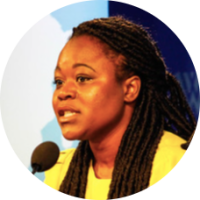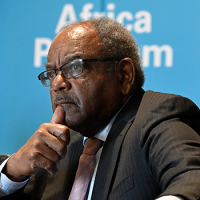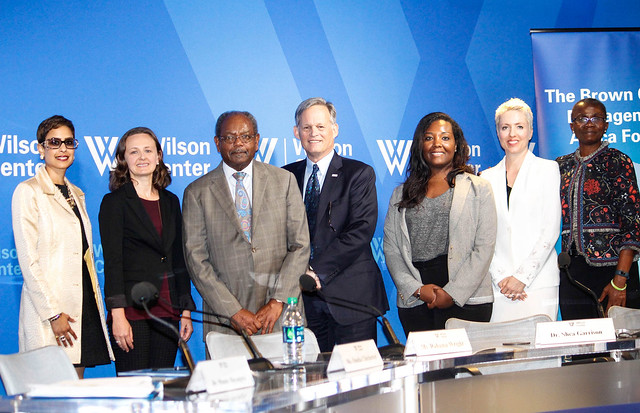Maximizing Women’s Economic Leadership, Participation, and Impact in Africa
On September 19, 2017, the Wilson Center Africa Program hosted a panel discussion on “Maximizing Women’s Economic Leadership, Participation, and Impact in Africa” as part of the Brown Capital Management Africa Forum. Dr. Blair Ruble, Vice President for Programs at the Wilson Center, offered opening remarks, followed by a welcome from Mr. Eddie C. Brown, the Founder, Chairman, and CEO of Brown Capital Management and Cabinet Member of the Wilson National Cabinet. The event featured five speakers: Mr. Wade Channell, Senior Economic Growth Advisor at the U.S. Agency for International Development; Ms. Ouida Chichester, Manager at Business for Social Responsibility; Dr. Shea Garrison, Program Manager at Vital Voices; Ms. Christina Hardaway, Gender and Entrepreneurship Officer at the U.S. Department of State; and, Ms. Rahama Wright, Founder and CEO of Shea Yeleen International and member of the President’s Advisory Council on Doing Business in Africa. In the forward-leaning discussion the panelists examined the current status, best practices, and ways forward for women’s economic participation in Africa, highlighting progress made and challenges faced by women in the labor market.
Ms. Chichester opened by setting the scene of why the economic empowerment of women matters for women, families, and their wider societies. Women in Africa are economically active, but their impact is too often constrained to the informal or domestic arenas. Gender inequality has severe economic consequences, including $95 billion lost annually in Africa. The key building blocks necessary to increase women’s economic empowerment include safe and equitable employment opportunities, social protection and childcare, and education and training. Businesses can work with actors in civil society and non-profits to help enable women’s economic empowerment. The challenges faced by female economic actors are complex, and improving women’s economic leadership requires investment from all sectors of society. Unlocking the potential of women could benefit businesses everywhere and transform African families, communities, and economies.
Dr. Garrison emphasized that the importance of women’s economic participation goes beyond feminism or gender equality – rather, the economic empowerment of women increases household bargaining power, bolsters economies, and leads to better health and educational outcomes. It has been shown that when women have more economic power, they largely use their incomes to improve the health and education of their families and society. Opportunities in small and medium enterprises are especially important, as these businesses account for 45 percent of employment. She noted that it is important to look at the quality of job participation, not just the percentage, and that engagement in the informal sector can leave women unprotected by labor laws and more vulnerable to exploitation. Garrison offered recommendations for increasing women’s access to networks for training and skills-building to bolster women’s full participation in the formal labor sector.
Ms. Wright urged us to look down the supply chain to find the root of the challenges to increasing women’s economic participation in Africa. The problems as well as the potential solutions can be located by evaluating how and where consumers purchase products. Wright emphasized the need to shift colonial models of economic production where value addition is located off the African continent. She also noted the importance of women gaining a living wage to give them more voice in decision-making, and noted how women frequently direct increased wages to educating their families. Using shea butter as a case study, Wright discussed how women can turn raw materials into value-added products that can be sold in market, thereby increasing their income and economic power. Capacity-building and training are two key tools for helping women understand and produce products for the wider market. She noted some of the key issues discussed by The Advisory Council on Doing Business in Africa to help inform future approaches, including the need for more and better data on women’s economic development and the importance of providing the ecosystem for women to create value-added products.
Ms. Hardaway offered her perspective on U.S. engagement with women’s economic empowerment in Africa, the most significant barriers, and recommendations for further action. Countries that respect the rights of women are generally more prosperous and secure, making inequality both a foreign policy and development challenge. U.S. policy encourages equal access to resources, services, and the formal economy and promotes women’s entrepreneurship through the African Women’s Entrepreneurship Program (AWEP). The strategy for women’s economic empowerment seeks to address the overarching issues that affect women’s economic participation, including access to technology, healthcare provision, and gender-based violence. The largest barriers to women’s economic empowerment include cultural norms, legal barriers, and lack of access to markets, capital, and networks. Hardaway’s key recommendations were to identify country-specific priority areas for legal and policy reforms; to encourage whole-of-government approaches that incorporate gender awareness into all programming; to adjust U.S. business models encourage inclusivity for women; to offer training for women to help them break into the market; and finally, for policymakers to make the case for how women’s economic participation creates opportunities for U.S. companies.
Mr. Channell noted that the approach to issues of empowerment and equality must be systemic and comprehensive, addressing the broad range of political, financial, and social angles. Strategies must also be formulated to the specific needs of the women they seek to help empower. The USAID draft framework for promoting women’s economic empowerment and equality, WE3, is a tool for creating programs that comprehensively address these issues. One of the key issues is finance, particularly access to commercial lending. Channell recommended creating systems in which it is easier for women to register companies, gain access to finance, garner greater security against risk, and find mentors and role models in the business sphere. In addition, Channell noted that violence is a key contributor to the unequal balance of power and has deleterious effects on societies and the ability for women to be economic actors, among other effects. USAID has been working to prevent and respond to gender-based violence, but more must be done in this area.
Launched in September 2015, the Brown Capital Management Africa Forum provides a premier platform for substantive and solutions-oriented dialogue on key trade, investment, and development issues in Africa, and in U.S.-Africa relations. Convening business leaders and policymakers, as well as subject matter experts from the United States and Africa, the Brown Capital Management Africa Forum sponsors a series of public events designed to support the development of economic engagement and policy options that advance mutually beneficial economic relations between Africa and the United States. The Brown Capital Management Africa Forum is made possible by the generous support of Brown Capital Management.
This event was livetweeted and webcast. Follow the Africa Program Twitter account @AfricaUpClose and catch up on the conversation #WomensEmpowerment.
Speakers

Introductions

Former Wilson Center Vice President for Programs (2014-2017); Director of the Comparative Urban Studies Program/Urban Sustainability Laboratory (1992-2017); Director of the Kennan Institute for Advanced Russian Studies (1989-2012) and Director of the Program on Global Sustainability and Resilience (2012-2014)

Moderator

Hosted By

Africa Program
The Africa Program works to address the most critical issues facing Africa and US-Africa relations, build mutually beneficial US-Africa relations, and enhance knowledge and understanding about Africa in the United States. The Program achieves its mission through in-depth research and analyses, public discussion, working groups, and briefings that bring together policymakers, practitioners, and subject matter experts to analyze and offer practical options for tackling key challenges in Africa and in US-Africa relations. Read more

